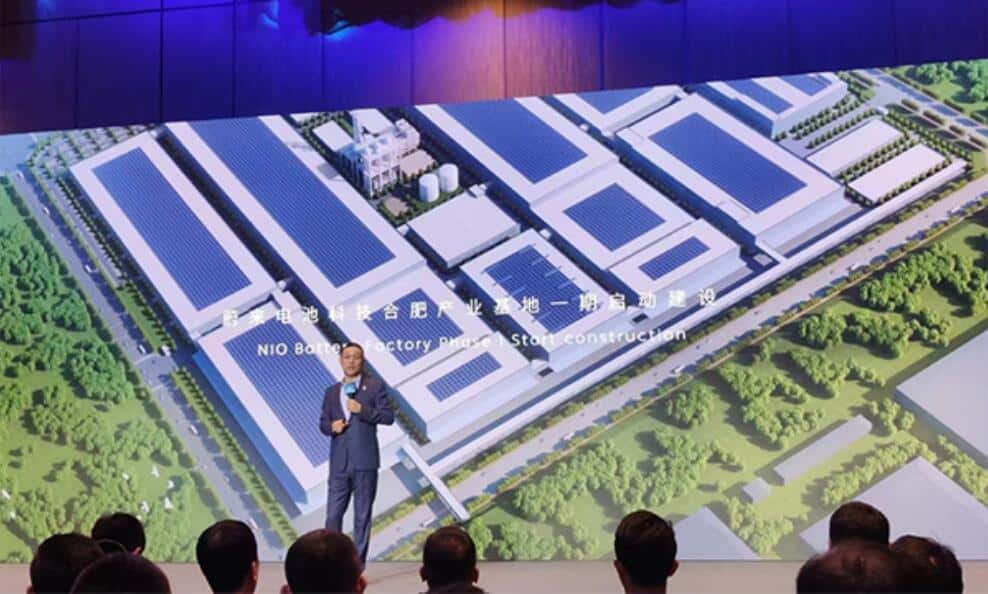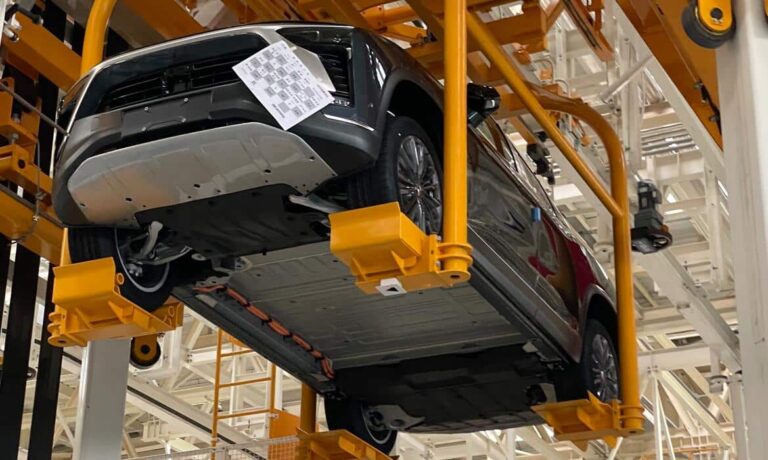Nio's battery team has been boosted to 1,000 people and is developing its own lithium manganese iron phosphate (LMFP) and 46 series ternary batteries, according to local media.
(Image credit: Cbea.com)
Nio (NYSE: NIO) held a battery partner forum in Hefei, Anhui province on February 24, where the company announced the start of construction of the first phase of its battery base, according to local media.
Beijing-based Cbea.com, which focuses on the battery industry, reported the information today, with an accompanying image showing William Li, Nio's founder, chairman and CEO, speaking on stage.
The PowerPoint page behind Li shows what appears to be a rendering of the Nio battery factory in Hefei, with text that reads "Nio Battery Factory Phase 1 Start Construction."
Upstream material suppliers, including Tsingshan Holding Group, participated in the forum, indicating that Nio already has a clear goal for battery manufacturing, the report said.
That's consistent with a February 24 report by another local media outlet, The Paper, which said it was easy to see from the big gathering that Nio is firmly committed to developing its own batteries -- and that its ambitions don't just involve battery packs, but also point to cells.
Earlier on February 24, Reuters reported that Nio plans to build its first battery factory to produce large cylindrical cells similar to those used by Tesla.
The new plant would have an annual battery capacity of 40 GWh and could power about 400,000 long-range electric vehicles (EVs), the report said.
The plant will be located next to Nio's main manufacturing center in Hefei, a move that seeks to reduce reliance on suppliers such as CATL, according to the report.
Li confirmed in a June 9, 2022 earnings call that the company will develop its own batteries, saying at the time that Nio has a battery team of more than 400 people to research areas including battery materials, cells and battery management systems to fully establish battery system development and industrialization capabilities.
The company's new battery pack will go into production in 2024, and it will support 800 V high-voltage fast charging, Li said at the time.
The latest information shows that Nio's battery team has grown to 1,000 people, Cbea.com reported today.
Nio is developing its own lithium manganese iron phosphate (LMFP) and 46 series ternary batteries and plans to mass produce both, the report said, citing people familiar with the matter.
The company's LMFP batteries will be supplied to its sub-brand codenamed ALPS that will target a market with a price range of RMB 200,000-300,000, the report said.
Nio's 46 series batteries will be used in 800 V packs and are expected to be used in its NT 3.0 platform models in 2024, according to the report.
Last August 24, local media outlet LatePost reported that Nio was developing LMFP and 4680 batteries in-house.
Nio will put the LMFP battery into small-scale production to supply the ALPS brand, whose models are expected to be available in 2024, according to the LatePost report.
In addition to investing efforts in developing batteries, Nio also took steps last year to lock in upstream raw material supplies.
Australian lithium company Greenwing Resources announced a strategic deal with Nio on September 26, in which the latter will subscribe to some of its equity.
Nio's primary goal in investing in Greenwing is for the latter to accelerate the development of the San Jorge lithium project in Argentina and to become a customer of the project on a priority basis, according to the report today by Cbea.com.
In addition to in-house development of batteries, Nio will continue to source power cells from external sources to ensure supply chain security and competitive advantage, according to the report.
To date, Nio's largest battery supplier remains CATL, while suppliers including CALB, Beijing WeLion New Energy Technology and Jiangsu Zenergy Battery Technologies have been introduced, the report said.
Previous regulatory filings show that Nio has been bringing in CALB as a new supplier since the launch of two new models, the EC7 and the new ES8, at the end of last year, according to a previous reports by CnEVPost.
WeLion is the supplier of Nio's 150-kWh semi-solid-state battery pack, which Nio co-founder and president Qin Lihong said at a media event on February 6 that deliveries will begin in the first half of this year.
It's worth noting that Zenergy is a smaller battery maker that hasn't received much attention before. This is the first time we've seen reports that Zenergy has also been introduced into Nio's battery supply system.
Separately, Jiemian reported today that for car companies' in-house efforts to develop batteries, the capacity needs to reach 50 GWh to break even.
For 100-kWh packs, for example, that would mean supplying at least about 500,000 electric vehicles, according to Zhang Yichao, a partner at Ernst & Young's global strategy consulting arm EY-Parthenon.
Nio is currently far from that goal, and its sales target this year is to surpass Lexus, which means annual sales of 200,000 units, Zhang said.

